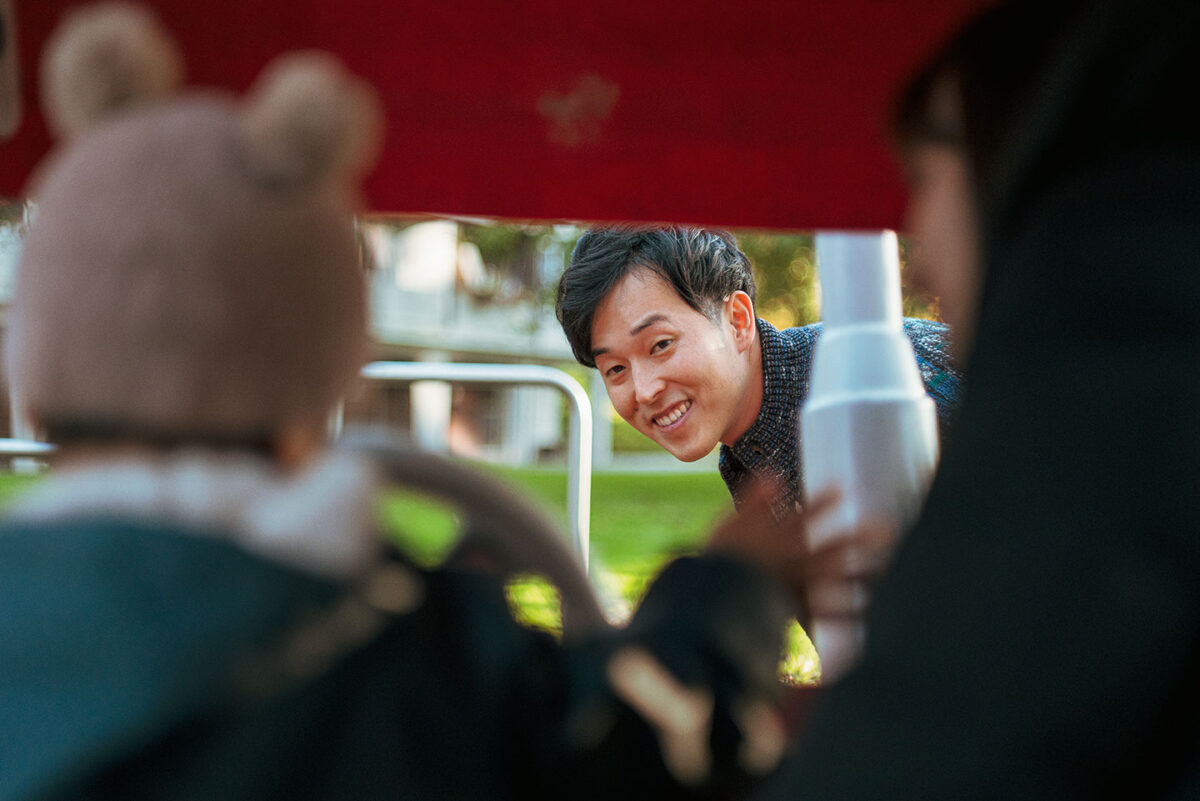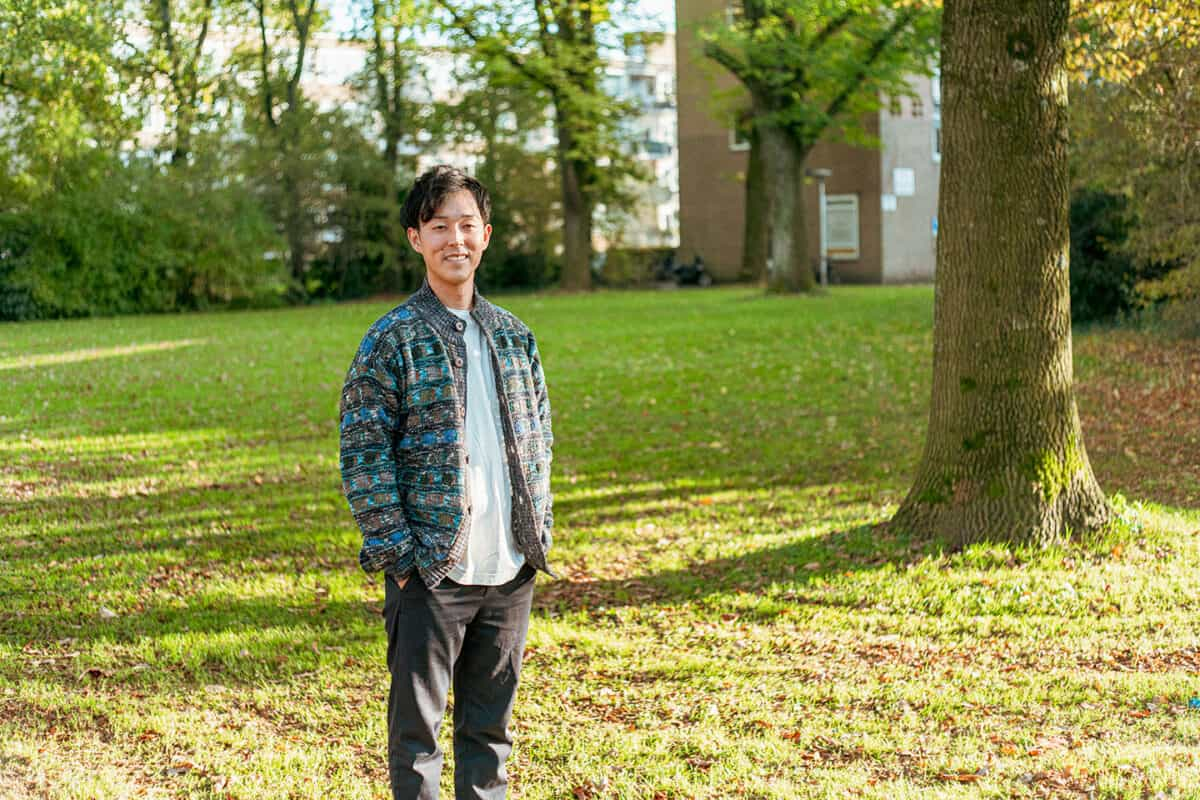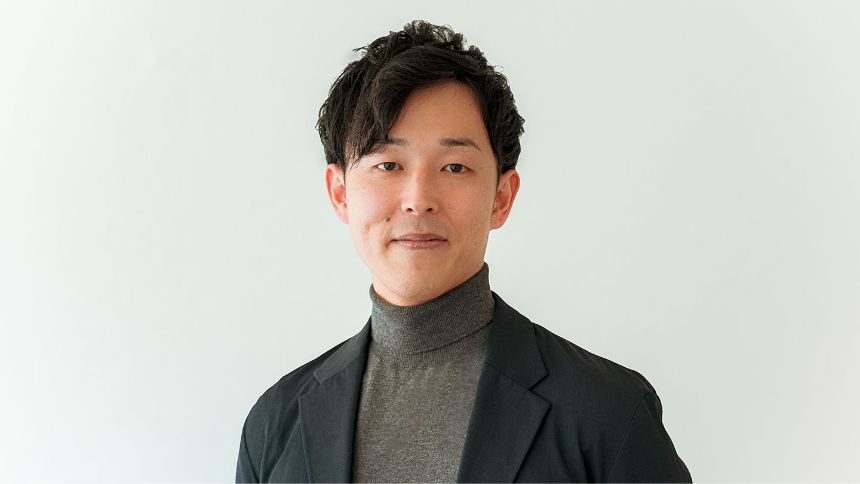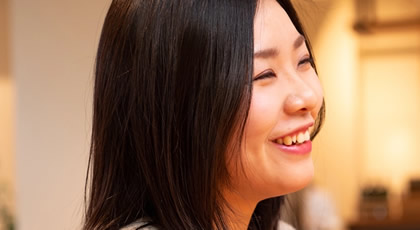
From “Me” to “Us”: Believing in Potential
In November 2024, Shuhei Hagimori, now entering his third year at TYPICA, was appointed as an Executive Officer.
Since joining TYPICA, Hagimori has been instrumental in several major initiatives. He led the launch of the company’s New York office and later spearheaded the development of the New Model, the latest iteration of TYPICA’s online platform, as the head of the Product Team. In November 2023, he relocated to Amsterdam with his wife and son, fulfilling a vision he had since the day he joined the company.
Driven by a desire to expand the potential of people and things, Hagimori began his career at BizReach, a Japan-based recruitment and HR solutions firm. From the outset, he was guided by a passion for global challenges. Now, in the midst of his fast-paced days at TYPICA, what thoughts keep him moving forward without pause?

Refocusing the lens
“Maybe I’m just not cut out for this. The company has high expectations for me, and I’m grateful, but I don’t think I can live up to them anymore.”
By August 2023, Hagimori was grappling with a crisis of confidence.
From the moment he joined TYPICA, unexpected challenges kept piling up. Originally, he had planned to lead the launch of the company’s US operations as a stepping stone toward a future leadership role in the Product Team. But when the person he hired to take over the New York office suddenly withdrew, those plans unraveled, and he had to step in to fill the gap.
The constant firefighting left him stuck in a reactive cycle, unable to address deeper, systemic issues. To make matters worse, the stress and uncertainty of relocating to Amsterdam with his family took a toll on his health.
While he held on to hopes of a brighter future overseas and was determined to succeed for his wife and child, doubt lingered.
The reality weighed heavily on him. He had no concrete accomplishments to back up his confidence that he could thrive in the Netherlands. No one at TYPICA had relocated abroad with children before, leaving him without a role model or guide. While he’d spent a year on a working holiday in Australia as a student, this was an entirely different situation. Though his wife never said it outright, her unease was evident in her expressions and demeanor, adding to his guilt about leading his family into such uncertainty.
At his breaking point, Hagimori considered resigning. When he shared his feelings with CEO Masashi Goto, Goto responded bluntly:
“Don’t you think it would weigh on your conscience to quit now? You must feel some guilt, knowing that everything you’ve been working on will be left unfinished. If escaping hardship is more important to you, then sure, you’re free to leave.”
Those words struck a chord. After several days of reflection, Hagimori made his decision: he would move to Amsterdam and continue his work at TYPICA.
“I always had this thought in the back of my mind – maybe I’d be better off at another company, where my skills might be a better fit. Maybe staying at TYPICA wasn’t the only option. But ultimately, quitting without achieving anything would’ve just been running away. Besides, knowing that the company wouldn’t be deeply affected by my departure made me even more determined to prove myself.”

For Hagimori, giving up on working in the Netherlands would’ve been the same as giving up on working at TYPICA. He’d joined the company because he wanted to bet on a team seriously aiming to compete globally. From the very beginning of the hiring process, he’d pictured himself living and working in the Netherlands. As he stood on the verge of throwing away the chance he’d fought so hard for, an inner voice kept urging him to hold on.
“Thinking about quitting because I wasn’t good enough was a clear sign I was too focused on myself. If I’d been truly committed to my vision, I wouldn’t even have been dwelling on that. Instead, I decided to keep going and focus on improving little by little. Talking it through with my wife also helped. She reminded me that moving to the Netherlands wasn’t a one-way ticket. Knowing that we could always come back to Japan if things didn’t work out put me at ease.
I wasn’t thorough enough in breaking down our plans into small, actionable steps that would lead us to our goals. I also failed to show my team the determination they needed to see from me. Without any past successes to lean on, I couldn’t rally team members who were already feeling defeated, and I wasn’t able to demonstrate true leadership. When I think about it now, I realize my sense of ownership just wasn’t strong enough.”
CEO Goto recalls:
“We hired Hagimori with the vision of grooming him as a future leader. That’s why we’ve always entrusted him with key roles and provided rigorous feedback. When he told me he wanted to resign, I thought: if he’s ready to quit halfway, then he wouldn’t be able to take on TYPICA’s future, and I’d be fine with letting him go. Leadership requires resilience. If he couldn’t handle something as minor as a hire dropping out at the last minute, he’d never manage the challenges of being an executive.
That said, I believed in his conscience, and in the end, he decided to keep going. In most cases, trust usually develops over time through shared experiences. But when it comes to management, the more you trust each other from the beginning, the more opportunities you gain to build on it, and the possibilities that come from that shared time are on another level. In business, results always show up in the numbers, so if someone has the will and aspirations, I choose to trust their conscience and see what they can achieve.”

Discovering a bigger world
Growing up in a rural part of Ehime Prefecture in southwestern Japan, Hagimori never gave much thought to life beyond his small hometown. That changed during a high school trip to Hawaii, where he realized just how limited his world had been.
“I used to get good grades in English at school, but when I landed in an English-speaking environment, I couldn’t say a word. Seeing locals speak so effortlessly made me question the years I’d spent in the classroom. I realized the divide between my world and theirs had unknowingly narrowed my potential. That realization made me want to step out into the world.”
Motivated by this awakening, Hagimori took a year off from Ritsumeikan University shortly after enrolling and headed to Australia on a working holiday. When he returned to Japan, he moved into a shared house near his university in Kyoto, where he met and interacted with more than 200 international travelers.
Hagimori also interned at Human Rights Watch, an international human rights NGO. During his time there, he learned about people in countries where women face systemic oppression – people who were persecuted by their governments simply for advocating for freedom and equal rights, such as women’s education. His university classes further shattered stereotypes he’d had about refugees as “unfortunate people forced out of their countries.” When he understood the deeper realities of their lives, and the potential they’d been stripped off, he couldn’t help but feel outraged.
Even after spending five years exposing himself to the wider world, including a year-long leave, Hagimori considered returning to his hometown after graduation to work for the prefectural government. He wanted to repay his parents for the freedom they’d always given him by staying close and being ready to support them. Thinking that this decision would make them happy, he shared his plans with his mother. After a brief pause, she gave him an answer he never expected:
“Is that really what you want to do? After everything you’ve experienced in high school and university, is this what you’ve decided you want?”
Looking back, Hagimori says, “Her question made me realize I didn’t have to feel guilty about living life the way I wanted. I think my mother probably dealt with the same kind of inner conflict herself. I’d sometimes see her looking tired or frustrated from work, and I always got the sense that something was weighing on her.
At the same time, her words also made me realize that I’d been letting other people control the direction of my life. I was about to take the easy way out just because I didn’t have something I felt strongly about. I’ve always wanted to change that about myself, that tendency to depend on something or someone else instead of steering my own life.”

Learning to stand on my own
After joining the soccer club upon entering junior high, it was in his third year that Hagimori met an upperclassman who would become his role model – Yamamoto (not his real name), two years his senior.
His school was an integrated junior high and high school, both located on the same campus. Because the soccer clubs practiced on the same field, he got to watch the high school players up close even as a junior high student.
Among the older students, Yamamoto stood out the most. Like Hagimori, he was a goalkeeper, but his exceptional skills had earned him a spot on the Shikoku regional select team. Watching him play was awe-inspiring, and it sparked a natural desire in Hagimori to become that kind of player. So, when Yamamoto invited Hagimori to train together, he jumped at the chance. From then on, he spent as much time as possible joining the high school team’s practices.
Practicing with Yamamoto not only deepened Hagimori’s admiration for his skills but also for his character and personality. Determined to absorb as much as he could from a senior who outclassed him in every way, Hagimori threw himself into training.
For about a year, until Yamamoto retired, Hagimori trained under his guidance and grew in ways he hadn’t thought possible. The tough practices pushed him hard, but knowing they were improving his skills made it all worth it. No one forced him to keep going – he simply wanted to follow in the footsteps of someone he looked up to. In the process, he uncovered a level of potential within himself he never imagined was there.
“That was a formative experience for me,” Hagimori recalls. “I wanted to become someone like him, someone who helps others unlock their potential. Seeing him run forward inspired me to keep going, and I developed a desire to become that kind of inspiration for others.”
For the two years after Yamamoto graduated and retired, Hagimori felt like he’d lost the spark he once had. He tried different ways to challenge himself, but his progress was nowhere near what it had been when he trained with Yamamoto. Without a mentor to guide him or hurdles to overcome, he realized just how hard it was to push himself forward—and how much he had been depending on others.
“It’s really precarious to rely on someone else or a specific environment for your growth,” he says. “It’s better to be able to grow no matter where you are. But even though I believed that, I couldn’t help feeling like I hadn’t grown as much at university or at BizReach as I did during that year with that upperclassman. Honestly, that’s part of what drew me to TYPICA. I wanted a chance to challenge myself and grow again.”

Paying It Forward
Since joining TYPICA, Hagimori has experienced a whirlwind of change, moving rapidly from heading the New York office to leading the Product Team and now stepping into the role of Executive Officer. His work developing the new online platform within the Product Team pushed him to look at the organization from a broader perspective, shifting his focus from “me” to “us.”
“When I first started, I was so caught up in my own tasks that I couldn’t see how to contribute to TYPICA’s big goal: democratizing direct trade for green coffee beans and achieving 400 billion yen in GMV by 2030. I’m still far from having everything figured out, but the hands-on experience of building something from scratch has helped me see things more clearly.”
He continues, “What struck me most during the process of developing the new online platform is that without a clear strategy or vision, nothing gets done. This is true in our daily operations as well – ownership often gets passed back and forth between the Origin Team and Community Managers, leaving some issues unresolved. Going forward, I plan to work closely with President Kasai-san to make bold decisions, speed up decision-making, and boost everyone’s productivity.”
For Hagimori, being a role model has always been a personal goal. Like the senior who once showed him his hidden potential, he wants to inspire others to see possibilities they didn’t know existed. This wish, which he’s carried for nearly 15 years, is one of the driving forces behind his work at TYPICA as he pushes himself to aim higher and help others follow.
“I’ve been knocked down in the ring and taken the count so many times. People watching from the outside might say, ‘You’ve already lost,’ but for me, losing is when you give up and walk away. Even if I’m flat on my back, I’ll still raise my fists and try to get up, even if it’s just on my knees. I think there are things you can only see by going through that process over and over.
But that’s just how I approach things. I’ve had moments where I worked so hard on what was right in front of me that I suddenly realized I’d climbed much higher than I thought possible. That’s happened at TYPICA and in other parts of my life. But not everyone climbs their mountain that way. I’ve learned that just showing others I’m moving forward isn’t enough to bring them along or help them unlock their hidden potential.
The last two years, and honestly, my entire 31 years, have been all about receiving. From here on, I want to start giving back. That means working together with others to build paths that reflect their goals, approaches, and individuality. I believe that’s how we can create a world where the potential of both people and things can truly blossom.”

For Goto, everything has gone according to plan. He gave Hagimori tougher challenges and treated him more strictly than others, not to be harsh, but because he believed in what Hagimori could achieve.
“What really stands out about him is his incredible work ethic and the sincere way he approaches everything. Take the New York office launch, for example. He worked tirelessly, visiting roasters from morning to night in freezing conditions to meet the targets he’d set. And at the end of every day, he’d reflect on what he’d accomplished and share it with me. Back then, his English wasn’t as strong as it is now, so I can only imagine the unseen struggles he faced.
There were times he almost gave up, but what’s amazing about him is his ability to engage on a soul level when you speak to him that way, no matter how tough things get. That willingness to keep going, even when things get overwhelming, is a testament to how seriously he takes his work.
Hagimori has earned the trust and endorsement of so many people. The founding members of Human Rights Watch’s Tokyo office, where he interned during his university days, spoke highly of him. The leader of the ICC Summit, where he volunteered as a committee member for seven years while working full-time, praised his dedication. Even the venture capitalists who invested in TYPICA have vouched for him. What stands out even more is his sincerity. Out of love for his mother, he reevaluated his true aspirations and made the decision to take on new challenges instead of returning to his hometown. That trust in how he has lived his life, even before TYPICA existed, is the very reason his appointment as Executive Officer was a decision we had confidence in from the moment he joined. I’m convinced that with his genuine passion for expanding the potential of people and things, he will lead TYPICA to grow tenfold, even a hundredfold.”
Read his Narrative from 2022 here.























